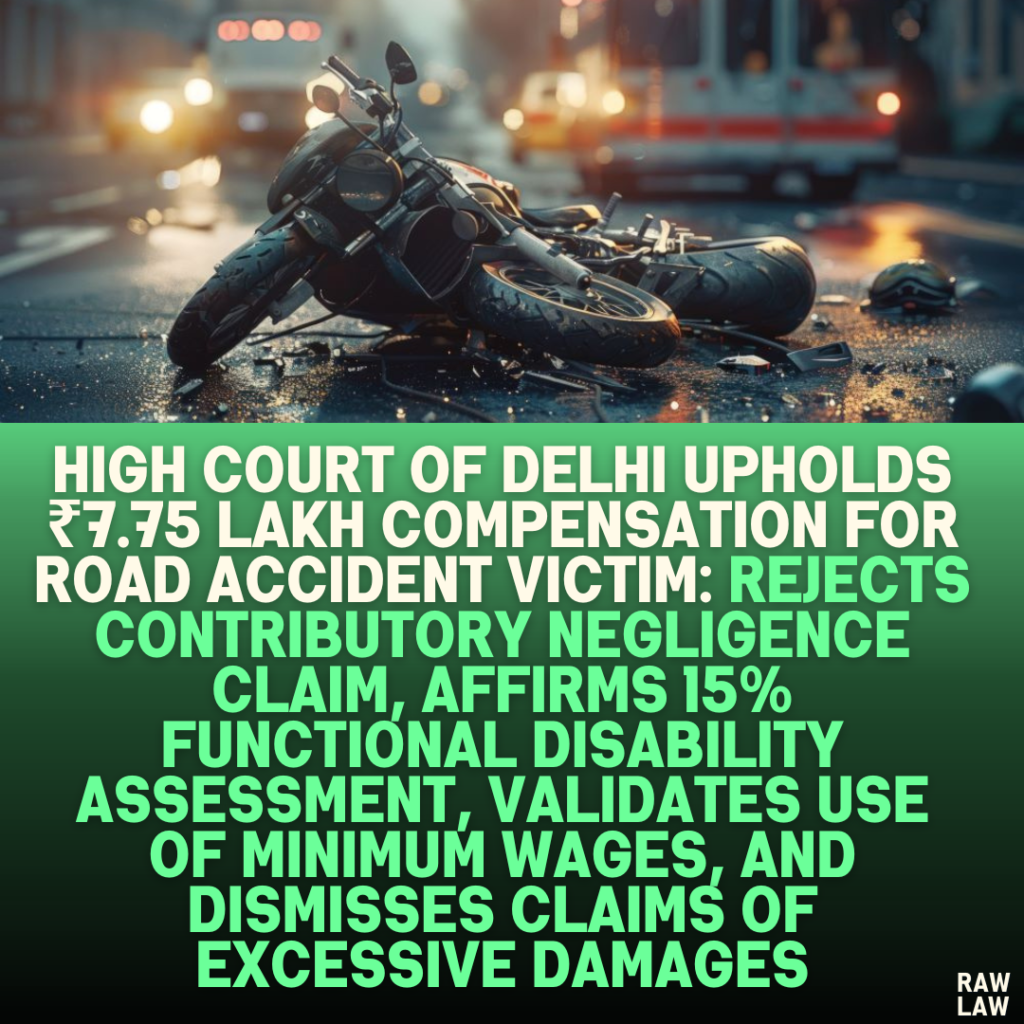1. Court’s Decision
The Delhi High Court rejected the appeal filed by the Deputy Commissioner of Police challenging the Motor Accident Claims Tribunal’s (MACT) award of ₹7,75,000, with interest at 9% per annum, to the injured respondent. The court concluded that:
- The accident was solely caused by the negligence of the motorcycle driver.
- The assessment of 15% functional disability was appropriate.
- The compensation amount was fair and required no modification.
2. Facts
- The incident occurred on 28th September 2014, at around 10:50 p.m., when the injured, a 27-year-old musician, had stepped out during a performance near Circular Road, Shahdara, to attend to nature’s call.
- While crossing the road near a Blind School, the victim was struck by a motorcycle ridden by a Head Constable of the Delhi Police. The motorcycle was reportedly driven in a rash and negligent manner.
- The injured suffered multiple injuries and was taken to Dr. Hedgewar Hospital for treatment.
- Following the accident, an FIR (No. 766/2014) under Sections 279 (rash driving) and 338 (causing grievous hurt by act endangering life or personal safety) of the IPC was registered at Farsh Bazar Police Station. A chargesheet was subsequently filed against the driver.
3. Issues
The High Court addressed the following legal issues raised in the appeal:
- Contributory Negligence: Was the injured party partially responsible for the accident?
- Functional Disability: Was the tribunal’s assessment of 15% functional disability accurate given the injured’s profession as a musician?
- Income Assessment: Could the tribunal use minimum wages as the basis for calculating loss of income in the absence of direct evidence?
- Compensation under Non-Pecuniary Heads: Was the awarded amount excessive given the nature of injuries?
4. Petitioner’s Arguments
The Deputy Commissioner of Police, as the appellant, presented the following contentions:
- The injured party acted negligently while crossing the road, contributing to the accident.
- The injured claimed 100% functional disability for his profession but failed to substantiate this. The assessment of 15% disability was excessive.
- The loss of income computation based on ₹8,554 (minimum wages) per month lacked proper evidentiary support.
- The compensation granted for non-pecuniary heads, such as pain and suffering, mental shock, and loss of amenities, was excessive.
5. Respondent’s Arguments
The injured/respondent countered these arguments, asserting:
- The driver of the motorcycle was solely negligent in causing the accident, as confirmed by the testimony and evidence on record.
- The functional disability assessment at 15% was fair and accounted for his reduced efficiency as a musician.
- The tribunal correctly used minimum wages to compute loss of income since direct evidence of income was unavailable.
- The compensation under non-pecuniary heads was reasonable, considering the permanent impact of the injuries on his life and profession.
6. Analysis of the Law
- Contributory Negligence: The court reiterated the principle that a motor vehicle driver has a duty of care to avoid collisions with pedestrians. In this case, the injured’s testimony, supported by the site plan and chargesheet, established that he was not negligent while crossing the road.
- Functional Disability: The Motor Vehicles Act requires disability assessments to consider the nature of injuries and their impact on the victim’s profession. The tribunal reasonably assessed the disability at 15%, accounting for his reduced efficiency without overestimating the incapacity.
- Income Assessment: In motor accident claims, when no direct evidence of income is available, courts often rely on minimum wages as a reasonable proxy. The tribunal’s reliance on this standard was deemed justifiable.
- Non-Pecuniary Compensation: The court held that damages for pain, suffering, and loss of amenities must consider the victim’s age, profession, and the nature of injuries. The amounts awarded were consistent with legal standards for such cases.
7. Precedent Analysis
Though the judgment does not explicitly reference precedents, the court followed well-established principles of tort law concerning contributory negligence and compensation assessment under the Motor Vehicles Act. It emphasized the burden of proof on the driver to show contributory negligence and reiterated that minimum wages can serve as a baseline for income computation.
8. Court’s Reasoning
- Contributory Negligence: The injured’s testimony was corroborated by:
- The site plan showing the accident occurred on the extreme right side of the road.
- The chargesheet filed against the driver, demonstrating prima facie evidence of his negligence.
- The driver failed to present any evidence to challenge these findings.
- Functional Disability: The injured claimed 100% functional disability but did not provide sufficient evidence. The tribunal’s 15% assessment was found to be reasonable.
- Income Assessment: Minimum wages were appropriately used since no other income proof was provided.
- Compensation under Non-Pecuniary Heads: Considering the injured’s young age, permanent disability (27% of the left lower limb), and professional impact, the court deemed the awarded amounts fair.
9. Conclusion
The appeal was dismissed, affirming the tribunal’s findings:
- The accident was caused solely by the driver’s negligence.
- The injured’s functional disability was rightly assessed at 15%.
- The compensation of ₹7,75,000 with 9% interest was upheld.
10. Implications
This judgment reinforces:
- The duty of motor vehicle drivers to exercise utmost care to avoid hitting pedestrians.
- The use of minimum wages as a standard for income computation in the absence of direct evidence.
- The courts’ commitment to fair compensation for accident victims, particularly when injuries have long-term professional and personal impacts.
